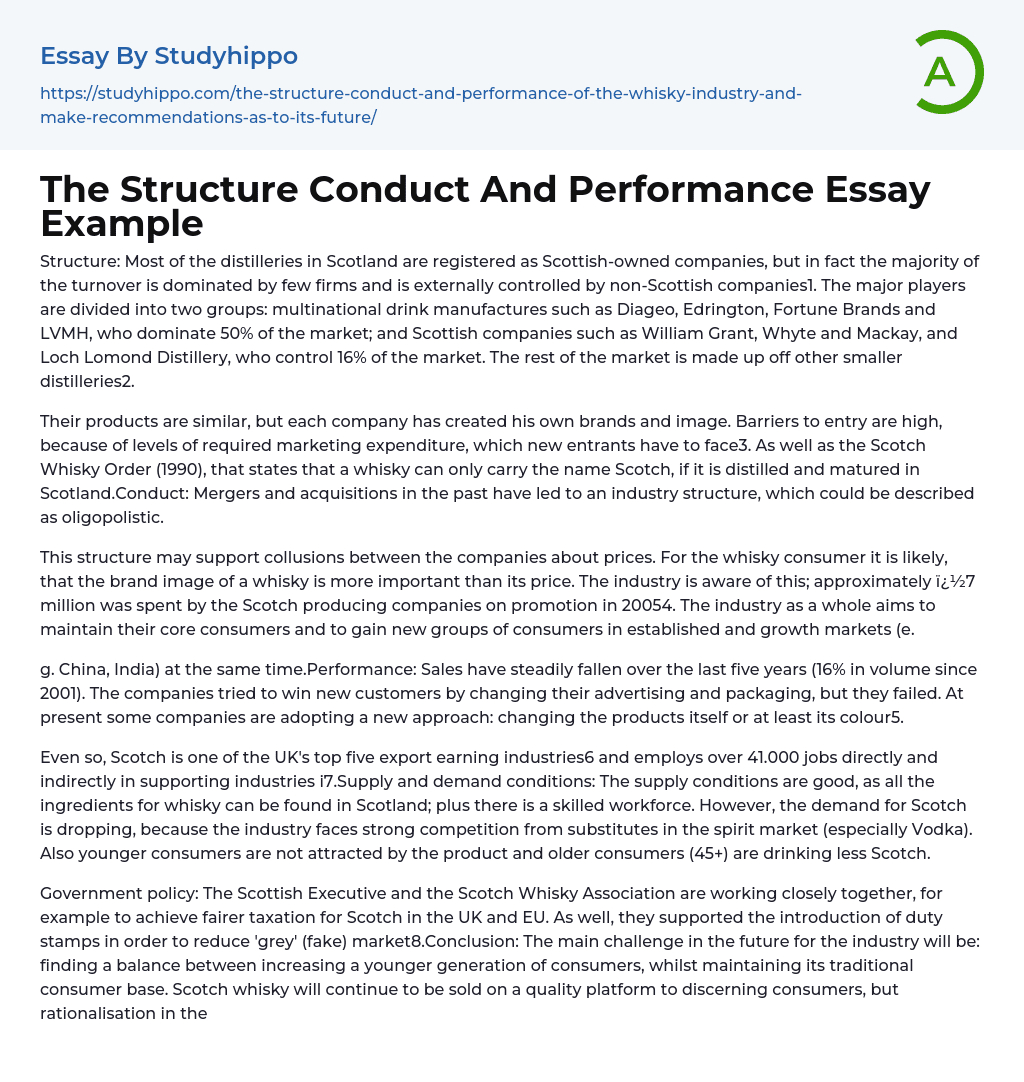While there are many distilleries in Scotland that are owned by Scottish companies, a significant majority of the market is controlled by several non-Scottish multinational drink manufacturers, including Diageo, Edrington, Fortune Brands, and LVMH. Together, these companies hold 50% of the market share. Meanwhile, Scottish-owned companies such as William Grant, Whyte and Mackay, and Loch Lomond Distillery only make up 16% of the market share. The remaining percentage belongs to smaller distilleries.
Despite offering similar products, each company has developed a unique brand and identity. Consequently, new entrants to the market face considerable hurdles due to significant marketing expenses. Moreover, the Scotch Whisky Order (1990) dictates that only whisky produced and matured in Scotland can be labeled as "Scotch." As a result of past mergers and acquisitions, the industry is considered oligopolistic.
It is possible that thi
...s framework could facilitate agreements among companies regarding pricing. However, for the consumer of whisky, the reputation of the brand may be more significant than its cost. The Scotch industry recognizes this fact and allocated around �7 million towards advertising in 2005. The industry's objectives are to retain their existing customer base and attract new demographics in both established and emerging markets.
Over the past five years, sales have continuously declined (by 16% in volume since 2001) despite attempts by companies to attract new customers through advertising and packaging changes. Some companies are now adopting a different strategy by modifying the product itself or its colour to remain competitive in markets like China and India.
Despite facing strong competition from substitutes in the spirit market, especially Vodka, Scotch remains one of the top five export earning industries in the UK and directly an
indirectly employs over 41,000 jobs in supporting industries. Although there are good supply conditions in Scotland, with all the ingredients for whisky readily available and a skilled workforce, the industry is experiencing a drop in demand. This can be attributed to a lack of appeal for the product among younger consumers and a decrease in consumption among older consumers aged 45 and above.
Collaboration between the Scottish Executive and the Scotch Whisky Association is focused on achieving equitable taxation for Scotch within the UK and EU, as well as the implementation of duty stamps to combat the 'grey' market. The industry's obstacle moving forward is striking a balance between enlarging its younger consumer demographic and retaining its traditional base. While maintaining its emphasis on quality, rationalization of brands is likely to occur in the future.
Scotch producing companies may choose to eliminate declining brands and focus instead on expanding in growth markets. As the majority of Scotch sales are externally controlled, it can no longer be considered a purely Scottish product. While continuing to support the industry, the Scottish Executive should also monitor the ownership structure.
- Chief Executive Officer essays
- Convenience Store essays
- Firm essays
- Training And Development essays
- Unilever essays
- Variable Cost essays
- Virgin Group essays
- Bargaining essays
- Entity essays
- Pest analysis essays
- John Locke essays
- 9/11 essays
- A Good Teacher essays
- A Healthy Diet essays
- A Modest Proposal essays
- A&P essays
- Academic Achievement essays
- Achievement essays
- Achieving goals essays
- Admission essays
- Advantages And Disadvantages Of Internet essays
- Alcoholic drinks essays
- Ammonia essays
- Analytical essays
- Ancient Olympic Games essays
- APA essays
- Arabian Peninsula essays
- Argument essays
- Argumentative essays
- Art essays
- Atlantic Ocean essays
- Auto-ethnography essays
- Autobiography essays
- Ballad essays
- Batman essays
- Binge Eating essays
- Black Power Movement essays
- Blogger essays
- Body Mass Index essays
- Book I Want a Wife essays
- Boycott essays
- Breastfeeding essays
- Bulimia Nervosa essays
- Business essays
- Business Process essays
- Canterbury essays
- Carbonate essays
- Catalina de Erauso essays
- Cause and Effect essays
- Cesar Chavez essays




